- Clone
- MAb414 (See other available formats)
- Regulatory Status
- RUO
- Other Names
- 107 kD nucleoporin, NPC proteins, Nuclear pore complex protein Nup107, Nucleoporin 107kD, Nucleoporin Nup107, NUP 107, NUP 84, NUP107, NUP153, NUP155, NUP84, NUP98
- Previously
-
Covance Catalog# MMS-120P
- Isotype
- Mouse IgG1
- Ave. Rating
- Submit a Review
- Product Citations
- publications
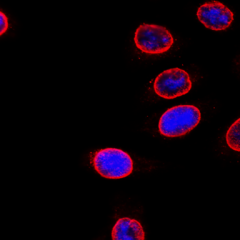
-

Immunofluorescence of HeLa with Nuclear Pore Complex Proteins Mouse primary antibody. Alexa Fluor® 594 (Red) Goat anti-Mouse IgG (Cat. No. 405326) was used as secondary antibody. Nuclei were counterstained with DAPI (Blue, Cat. No. 422801). Exposure time is 80 ms. Concentration is 1 µg/ml. -

HeLa cells were fixed with 4% paraformaldehyde (PFA) for 15 minutes, permeabilized with 0.5% Triton X-100 for 3 minutes, and blocked with 5% FBS for 60 minutes. Then the cells were intracellularly stained with (A) mouse IgG1, κ isotype control (Negative, Cat. No. 401402) or (B-D) Nuclear Pore Complex (Clone Mab414) overnight at 4°C followed by Alexa Fluor® 647 (Red) Goat anti-Mouse IgG (Cat. No. 405322) incubation for one hour at room temperature. The image was captured with a 60X objective using KEYENCE BZ-X700 fluorescence microscope. Exposure time (Seconds) for (A-D) is 1/5. Concentrations for (A-B) is 5 µg/ml, (C) is 2 µg/ml and (D) is 0.5 µg/ml. -

Western blot analysis of cell lysates from HaCaT, Daudi (Human), Raw264.7 (Mouse) and UMR106 (Rat) using Nuclear Pore Complex Proteins Mouse primary antibody and HRP Goat anti-Mouse secondary antibody (Cat. No. 405306). GAPDH (Cat. No. 919501) was used as a loading control. -

IHC staining using purified anti-NPC antibody (clone Mab414) on formalin-fixed paraffin-embedded human tonsil tissue. The tissue was incubated with 1 μg/mL of anti-NPC antibody overnight at 4°C, followed by incubation with 2.5 μg/mL of Alexa Fluor® 647 goat anti-mouse IgG antibody (red) (Cat. No. 405322) for one hour at room temperature. Nuclei were counterstained with DAPI (blue) (Cat. No. 422801), and the slide was mounted with ProLong™ Gold Antifade Mounting Solution. The image was captured with a 40x objective. Scalebar = 50 μM.
Nuclear pores are large protein complexes that cross the nuclear envelope. The proteins that make up the nuclear pore complex are known as nucleoporins. About half of the nucleoporins typically contain solenoid protein domains—either an alpha solenoid or a beta-propeller fold, or in some cases both as separate structural domains. Each NPC contains at least 456 individual protein molecules and is composed of 30 distinct proteins (nucleoporins). The other half show structural characteristics typical of "natively unfolded" or intrinsically disordered proteins, i.e. they are highly flexible proteins that lack ordered secondary structure. These disordered proteins are the FG nucleoporins, so called because their amino-acid sequence contains many phenylalanine—glycine repeats.
Nuclear pore complexes allow the transport of molecules across the nuclear envelope. This transport includes RNA and ribosomal proteins moving from nucleus to the cytoplasm and proteins (such as DNA polymerase and lamins), carbohydrates, signaling molecules and lipids moving into the nucleus. Although smaller molecules simply diffuse through the pores, larger molecules may be recognized by specific signal sequences and then be diffused with the help of nucleoporins into or out of the nucleus.. Each of the eight protein subunits surrounding the actual pore (the outer ring) projects a spoke-shaped protein over the pore channel.
Nucleoporin p62 (p62) protein remains associated with the nuclear pore complex-lamina fraction. p62 is synthesized as a soluble cytoplasmic precursor of 61 kDa followed by modification that involve addition of N-acetylglucosamine residues, followed by association with other complex proteins.The protein encoded by this gene is a member of the FG-repeat containing nucleoporins and is localized to the nuclear pore central plug. This protein associates with the importin alpha/beta complex which is involved in the import of proteins containing nuclear localization signals. Multiple transcript variants of this gene encode a single protein isoform.
P62 is a serine/threonine rich protein of ~520 amino acids, with tetrapeptide repeats on the amino terminus and a series of alpha-helical regions with hydrophobic heptad repeats. P62 assembles into a complex containing 3 addition proteins, p60, p54 and p45 forming the p62 complex of ~235 kDa. Glycosylation appears to be involved in the assembly and disassembly of p62 into higher order complexes, and a serine/threonine rich linker region between Ser270 to Thr294 appear to be regulatory. The p62 complex is localized to both the nucleoplasmic and cytoplasmic sides of the pore complex and the relative diameter of p62 complex relative to the nuclear pore complex suggests it interacts in pore gating.
Antibodies to p62 complex are involved in 1 or more autoimmune diseases. P62 glycosylation is increased in diabetes. p62 is also more frequent in Stage IV primary biliary cirrhosis and is prognostic for severe disease. Reduced p62 production has been linked to Alzheimer's disease. It is thought oxidative damage of the p62 promoter is correlated with AD and other neurodegenerative disorders.
Product Details
- Verified Reactivity
- Human, Mouse, Rat
- Reported Reactivity
- Other species
- Antibody Type
- Monoclonal
- Host Species
- Mouse
- Immunogen
- The antibody was raised using a nuclear pore complex mixture.
- Formulation
- Phosphate-buffered solution + 0.03% Thimerosal.
- Preparation
- The antibody was purified by affinity chromatography.
- Concentration
- 1 mg/ml
- Storage & Handling
- The antibody solution should be stored undiluted between 2°C and 8°C. Please note the storage condition for this antibody has been changed from -20°C to between 2°C and 8°C. You can also check your vial or your CoA to find the most accurate storage condition for this antibody.
- Application
-
ICC - Quality tested
WB, IHC-P - Verified
IHC-F, IP, IEM - Reported in the literature, not verified in house - Recommended Usage
-
Each lot of this antibody is quality control tested by immunocytochemistry. For immunocytochemistry, a concentration range of 0.5 - 1 μg/mL (1:1000 - 1:2000 dilution) is recommended. For Western blotting, the suggested use of this reagent is 0.2 - 0.5 µg per mL (1:2000 - 1:5000). For immunohistochemical staining on formalin-fixed paraffin-embedded tissue sections, a concentration range of 0.5 - 1 µg/mL is suggested. For immunohistochemical staining on frozen tissue sections, a dilution of 1:500 is suggested. For immunoprecipitation and electron microscopy, the suggested dilution of this reagent is 1:5000. It is recommended that the reagent be titrated for optimal performance for each application.
- Application Notes
-
This antibody is effective in immunoblotting (WB), immunohistochemistry (IHC), immunofluorescence (IF), immunoprecipitation (IP) and immunoelectron microscopy (IEM). This antibody has been used successfully with frozen sections.
*Predicted MW = 62 kD
MAb414 is a reliable general purpose monoclonal antibody which recognizes a related family of NPC proteins. This antibody is ideal for studying the morphology and composition of the nucleus and nuclear envelope. It is also useful in studying changes in the nuclear structure during mitosis and meiosis. - Application References
-
- Zheng X, et al. 2012. J. Biol. Chem. 287:38254. (IF) PubMed
- Kimura T, et al. 2003. Mol Cell Biol. 23:1304. (IHC) PubMed
- Lopez-Soler RI, et al. 2001. J Cell Biol. 154:61. (IF, WB) PubMed
- Aris JP, Blobel G. 1989. J Cell Biol. 108:2059. (WB, IP, IF, EM) PubMed
- Davis LI, Blobel G. 1987. PNAS USA. 84:7552. (IP, IF) PubMed
- Edens LJ, Levy DL. 2014. J. Cell. Biol. 206:473.
- Davis LI, Blobel G. 1986. Cell. 45:699.
- Blobel G. 1985. PNAS USA 82:8527.
- Product Citations
-
- RRID
-
AB_2565026 (BioLegend Cat. No. 902907)
AB_2565026 (BioLegend Cat. No. 902901)
AB_2565026 (BioLegend Cat. No. 902902)
Antigen Details
- Biology Area
- Cell Biology, Cell Motility/Cytoskeleton/Structure, Neuroscience, Neuroscience Cell Markers
- Molecular Family
- Nuclear Markers
- Antigen References
-
1. Yoshimura S, et al. 2013. J. Cell Sci. 126:3141-50.
- Gene ID
- NA
- Specificity (DOES NOT SHOW ON TDS):
- Nuclear Pore Complex Proteins
- Specificity Alt (DOES NOT SHOW ON TDS):
- Nuclear Pore Complex Proteins
- App Abbreviation (DOES NOT SHOW ON TDS):
- ICC,WB,IHC-P,IHC-F,IP,IEM
- UniProt
- View information about Nuclear Pore Complex Proteins on UniProt.org
Related Pages & Pathways
Pages
Related FAQs
Other Formats
View All Nuclear Pore Complex Proteins Reagents Request Custom ConjugationCustomers Also Purchased
Compare Data Across All Formats
This data display is provided for general comparisons between formats.
Your actual data may vary due to variations in samples, target cells, instruments and their settings, staining conditions, and other factors.
If you need assistance with selecting the best format contact our expert technical support team.
-
Purified anti-Nuclear Pore Complex Proteins
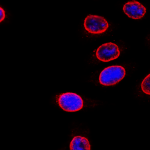
Immunofluorescence of HeLa with Nuclear Pore Complex Protein... 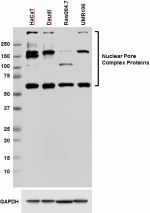
Western blot analysis of cell lysates from HaCaT, Daudi (Hum... 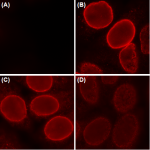
HeLa cells were fixed with 4% paraformaldehyde (PFA) for 15 ... 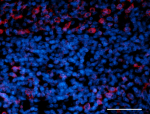
IHC staining using purified anti-NPC antibody (clone Mab414)... -
Alexa Fluor® 594 anti-Nuclear Pore Complex Proteins
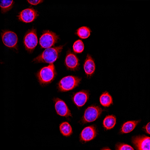
HeLa cells were fixed with 100% methanol for 15 minutes at -... -
Direct-Blot™ HRP anti-Nuclear Pore Complex Proteins
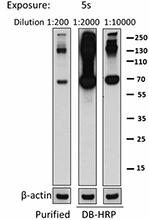
15 µg of total protein extract from HeLa was resolved by ele... -
Alexa Fluor® 647 anti-Nuclear Pore Complex Proteins
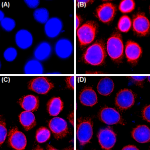
HeLa cells were fixed with methanol for 10 minutes and block... 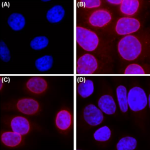
HeLa cells were fixed with 4% paraformaldehyde (PFA) for 15 ... 
HeLa cells were fixed with 4% paraformaldehyde (PFA) for 15 ... 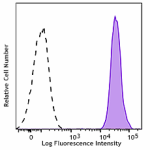
Jurkat cells were fixed, permeabilized and intracellularly s... -
TotalSeq™-A0451 anti-Nuclear Pore Complex Proteins Hashtag 1
-
TotalSeq™-A0452 anti-Nuclear Pore Complex Proteins Hashtag 2
-
TotalSeq™-A0453 anti-Nuclear Pore Complex Proteins Hashtag 3
-
TotalSeq™-A0454 anti-Nuclear Pore Complex Proteins Hashtag 4
-
TotalSeq™-A0456 anti-Nuclear Pore Complex Proteins Hashtag 6
-
TotalSeq™-A0457 anti-Nuclear Pore Complex Proteins Hashtag 7
-
TotalSeq™-A0458 anti-Nuclear Pore Complex Proteins Hashtag 8
-
TotalSeq™-A0459 anti-Nuclear Pore Complex Proteins Hashtag 9
-
TotalSeq™-A0460 anti-Nuclear Pore Complex Proteins Hashtag 10
-
TotalSeq™-A0455 anti-Nuclear Pore Complex Proteins Hashtag 5
-
TotalSeq™-A0462 anti-Nuclear Pore Complex Proteins Hashtag 12
-
TotalSeq™-A0463 anti-Nuclear Pore Complex Proteins Hashtag 13
-
TotalSeq™-A0465 anti-Nuclear Pore Complex Proteins Hashtag 15
-
TotalSeq™-A0461 anti-Nuclear Pore Complex Proteins Hashtag 11
-
TotalSeq™-A0464 anti-Nuclear Pore Complex Proteins Hashtag 14
-
TotalSeq™-B0453 anti-Nuclear Pore Complex Proteins Hashtag 3
-
TotalSeq™-B0452 anti-Nuclear Pore Complex Proteins Hashtag 2
-
TotalSeq™-B0451 anti-Nuclear Pore Complex Proteins Hashtag 1
-
TotalSeq™-B0458 anti-Nuclear Pore Complex Proteins Hashtag 8
-
TotalSeq™-B0457 anti-Nuclear Pore Complex Proteins Hashtag 7
-
TotalSeq™-B0464 anti-Nuclear Pore Complex Proteins Hashtag 14
-
TotalSeq™-B0471 anti-Nuclear Pore Complex Proteins Hashtag 21
-
TotalSeq™-B0472 anti-Nuclear Pore Complex Proteins Hashtag 22
-
TotalSeq™-A0469 anti-Nuclear Pore Complex Proteins Hashtag 19
-
TotalSeq™-A0470 anti-Nuclear Pore Complex Proteins Hashtag 20
-
TotalSeq™-A0472 anti-Nuclear Pore Complex Proteins Hashtag 22
-
TotalSeq™-B0465 anti-Nuclear Pore Complex Proteins Hashtag 15
-
TotalSeq™-B0463 anti-Nuclear Pore Complex Proteins Hashtag 13
-
TotalSeq™-B0469 anti-Nuclear Pore Complex Proteins Hashtag 19
-
TotalSeq™-B0474 anti-Nuclear Pore Complex Proteins Hashtag 24
-
TotalSeq™-A0471 anti-Nuclear Pore Complex Proteins Hashtag 21
-
TotalSeq™-B0462 anti-Nuclear Pore Complex Proteins Hashtag 12
-
TotalSeq™-B0460 anti-Nuclear Pore Complex Proteins Hashtag 10
-
TotalSeq™-B0461 anti-Nuclear Pore Complex Proteins Hashtag 11
-
TotalSeq™-A0474 anti-Nuclear Pore Complex Proteins Hashtag 24
-
TotalSeq™-A0473 anti-Nuclear Pore Complex Proteins Hashtag 23
-
TotalSeq™-B0454 anti-Nuclear Pore Complex Proteins Hashtag 4
-
TotalSeq™-B0455 anti-Nuclear Pore Complex Proteins Hashtag 5
-
TotalSeq™-B0459 anti-Nuclear Pore Complex Proteins Hashtag 9
-
TotalSeq™-A0466 anti-Nuclear Pore Complex Proteins Hashtag 16
-
TotalSeq™-A0467 anti-Nuclear Pore Complex Proteins Hashtag 17
-
TotalSeq™-B0466 anti-Nuclear Pore Complex Proteins Hashtag 16
-
TotalSeq™-B0467 anti-Nuclear Pore Complex Proteins Hashtag 17
-
TotalSeq™-B0470 anti-Nuclear Pore Complex Proteins Hashtag 20
-
TotalSeq™-B0468 anti-Nuclear Pore Complex Proteins Hashtag 18
-
TotalSeq™-A0468 anti-Nuclear Pore Complex Proteins Hashtag 18
-
TotalSeq™-B0456 anti-Nuclear Pore Complex Proteins Hashtag 6
-
TotalSeq™-B0473 anti-Nuclear Pore Complex Proteins Hashtag 23
 Login / Register
Login / Register 





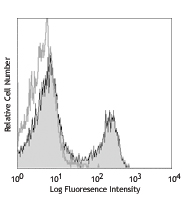
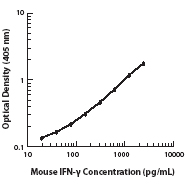
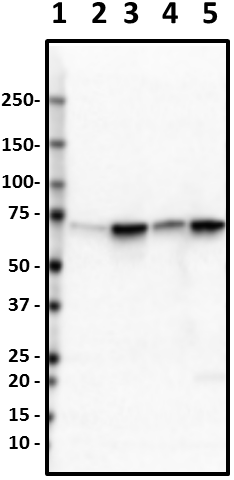



Follow Us